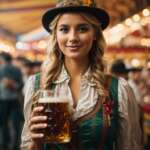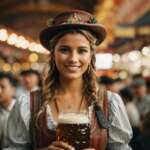When did the Oktoberfest in Germany start?
About Oktoberfest in Germany Festival
Oktoberfest is one of the most beloved annual festivals in Germany. Taking place primarily in Munich every year, Oktoberfest is a pioneering celebration of the traditional Bavarian culture and an event that unites hundreds of thousands of people over food, beer and good times.
Since its inception in 1810, Oktoberfest has become the world's largest event of its kind. Thousands of people, from Germany and around the world, come and visit throughout the festival period, which usually runs from the end of September until the beginning of October.
Oktoberfest is essentially a food and beer festival, but there's lots more to it than that. There are traditional Bavarian handicrafts, live music, amusement park rides, and an array of other fun activities. Every year, the festival is held in the world-famous Theresienwiese and is kicked off with an impressive horse race and a concurrent folk music concert. It is a truly special experience where Bavarians and guests from around the world come together to celebrate the start of the fall season.
Don’t forget to check out our latest articles, we hope you find it informative and inspiring:
Experience the Joy of Oktoberfest – The Ultimate Bavarian Beer Festival!
Oktoberfest in Germany
Oktoberfest is an annual celebration of Bavarian culture in Germany. Taking place during late September into early October, it is one of the most popular traditional festivals in the world. Here we take a closer look at the fascinating history and customs of this beloved German holiday.
History and Origin
Oktoberfest dates back to 1810 when the citizens of Bavaria celebrated the marriage of Crown Prince Ludwig and Princess Therese of Saxony-Hildburghausen. The celebration consisted of a horse race, buoyed by the support of all of Bavaria’s citizens. After the horse race, a big wedding feast was held and the citizens of Munich were invited to attend, leading to the tradition of the parade. This was the beginning of what we now recognize as Oktoberfest.
What started as a single day of celebration for the royal wedding has now grown to include 16 days of beer drinking events, beginning on a Saturday in late September and ending on the first Sunday in October. The original event still takes place today, although it is now framed as a celebration of Bavarian culture instead of a commemoration of the royal event.
When it was first celebrated, Oktoberfest was known as the “Autumn Festival.” This was due to the fact that it was held in September rather than October, and was celebrated primarily in the city of Munich. Over the course of the years, Oktoberfest grew in popularity. It soon became an event that was celebrated in nearly every city and town in Germany.
Significance and Meaning
Oktoberfest in Germany has a great deal of cultural significance. It is a celebration of the harvest season which has been observed in many cultures around the world. For the Bavarians, Oktoberfest is a celebration of the traditional Bavarian culture. It is a time to celebrate the unique Bavarian cuisine, dress, music, and dance.
Oktoberfest is also a celebration of family and friends coming together to share in the joy of the festivities. The event offers a unique opportunity to come together and celebrate with friends and family and, of course, to enjoy some delicious Bavarian beer.
Traditions and Celebrations
At Oktoberfest, there are a number of traditional customs that take place. An important ritual that is practiced is the tapping of the keg which traditionally marks the beginning of the festival. This is usually done by local leaders or the mayor of the hosting city.
The traditional Bavarian costumes are also an important part of the celebration. Men typically wear leather shorts, known as Lederhosen, and white shirts with broad suspenders. Women wear traditional dresses called Dirndls, which feature a blouse, skirt, apron, and bodice.
In addition to the traditional festivities, there are a number of activities and performances that take place during the celebration such as rides, games, and live performances. Another popular activity during Oktoberfest is feasting on Bavarian cuisine such as pork knuckles, Wiener schnitzel, and sausages. A variety of beers are served throughout the celebration including Munich’s Oktoberfest beer.
Geographical Spread
Oktoberfest is celebrated throughout Germany but is particularly popular in the region of Bavaria and the city of Munich. This region is where the original celebration was held and is considered the home of Oktoberfest.
Today, the festival has spread to other parts of the world, with variations in how it is celebrated. In some countries, such as the United States, the event has been commercialized. But in other countries, such as the Netherlands and New Zealand, they celebrate Oktoberfest in a more traditional way, using traditional Bavarian costumes, playing traditional Bavarian music, and serving traditional Bavarian food.
Modern Day Observations
Despite its popularity, the modern-day celebration of Oktoberfest has changed significantly over the years, mostly due to the introduction of different technologies and better safety regulations. In recent years, less emphasis has been placed on horse racing, although this activity is still regarded as an important part of the festivities.
Modern-day technology also means that music is played through speakers instead of traditional live Bavarian bands. This has lent the event a more contemporary atmosphere, while still celebrating in a traditional way. Despite the changes, Oktoberfest remains in its essence an authentic traditional festival that deeply respects the Bavarian culture.
Interesting Facts or Trivia
• The original Oktoberfest was celebrated on October 12th, 1810, in honour of the wedding of Crown Prince Ludwig and Princess Therese of Saxony-Hildburghausen.
• The first Oktoberfest in 1810 was attended by approximately 40,000 to 50,000 people.
• Oktoberfest attracts more than 6 million visitors each year, making it the world’s largest folk festival.
• In 1980, the world’s largest beer tent – known as the “Hippodrom” – was built at Oktoberfest. It can hold up to 10,000 visitors and serves more than 30,000 liters of beer each day.
• Each year, the Oktoberfest hosts around 654,000 Maß (one-liter beer glasses) of beer, and 7,000,000 roast chickens.
• At least 5 million visitors dress up in traditional Bavarian clothing during Oktoberfest.
• The traditional Oktoberfest song entitled “Ein Prosit der Gemütlichkeit” (Cheers to Gemütlichkeit) is played every day at the opening of Oktoberfest.
• At Oktoberfest, there is a special beer tent only for women, Loreley. It was the first all-female beer tent opened in 2005.
• Each year, there is a grand parade at Oktoberfest known as the “Trachtler” (Traditional Costumes ) parade in which people from all over Germany show off their traditional Bavarian attire.
• In 2010, the Oktoberfest celebrated its 200th anniversary and over 6 million people attended throughout the 16 days.
Holiday Wishes
• Wishing you a wonderful Oktoberfest filled with friends, family, and lots of beer!
• Cheers to a fun and festive Oktoberfest!
• May your Oktoberfest beer be frothy and your laughter be plenty!
• Happy Oktoberfest! Wishing you much happiness and joy!
• Have a joyous Oktoberfest!
Holiday Messages
• Bring on Oktoberfest! It’s time for celebrating with family and friends.
• Time to dust off the lederhosen and dirndl and head to the Wies’n!
• A toast to Bavarian culture and a happy Oktoberfest!
• Tis the season for giving thanks and celebrating tradition.
• Raise your mugs for a hearty cheers to one of the world’s largest folk festivals!
Holiday Quotes
• “Beer is proof that God loves us and wants us to be happy” – Benjamin Franklin
• “Life is too short to drink bad beer” – Anonymous
• “As long as there is beer, everything is fine” – German Proverb
• “Once you have tasted beer, you will forever walk the Earth with your eyes turned skyward, for there you have been and there you will long to return” – Anonymous
• “In beer there is freedom, in wine there is health, in cognac there is power and in water there is bacteria” – Anonymous
Other Popular Holiday Info
Oktoberfest is a great opportunity to learn something about Bavarian culture and customs. Many of the activities that take place at Oktoberfest have a rich cultural background. For example, the tradition of drinking beer out of a Maß, a one-liter glass, has a longstanding history. Before the introduction of the Maß, people drank beer from half-liter and three-quarter-liter mugs.
There are also some unique customs that surround the drinking of beer. For instance, it is customary to raise your glass and make a toast before drinking. It is also said to be bad luck to leave your beer unfinished. Furthermore, some people carry their Maß around with them in order to avoid losing it and having to purchase a new one.
Joining in the festivities of Oktoberfest can also be a great way to meet new people and make new friends. Many people flock to the festival just to experience the unique atmosphere and take part in the traditions, such as the elaborate costume parties and the wildly-popular beer tents. Participating in Oktoberfest is sure to provide some amazing memories that can last a lifetime.
Conclusion
Oktoberfest in Germany continues to be one of the world’s most popular traditional festivals. From its roots as a wedding celebration to its modern-day festivities that attract millions of people from around the world, this historic celebration is sure to provide lasting memories. We invite you to join in the festivities and celebrate one of the world’s greatest traditions. Prost!
How to Say "Oktoberfest in Germany" In Different Languages?
- Chinese
- 十月啤酒节 (zh-Hans-CN)
- Croatian
- Oktobarska fiesta (hr-HR)
- English
- Oktoberfest (en-AU)
- Finnish
- Oktoberfest (fi-FI)
- French
- Oktoberfest (fr-FR)
- German
- Oktoberfest (de-DE)
- Greek
- Οκτωβριακός Φεστιβάλ (el-GR)
- Hebrew
- קוקטוברפסט (he-IL)
- Hindi
- आक्टोबरफेस्ट (hi-IN)
- Hungarian
- Októberfest (hu-HU)
- Indonesian
- Oktoberfest (id-ID)
- Italian
- Oktoberfest (it-IT)
- Polish
- Święto Piwne (pl-PL)
- Portuguese
- Oktoberfest (pt-BR)
- Romanian
- Festivalul berii (ro-RO)
- Russian
- Октябрьский фестиваль (ru-RU)
- Spanish
- Oktoberfest (es-AR)
- Thai
- งานโอกต็อเบอร์เฟสต์ (th-TH)
- Turkish
- Ekim Festivali (tr-TR)
Oktoberfest in Germany Also Called
The Bavarian Festival.Countries where "Oktoberfest in Germany" is celebrated:
FUN FACT:
In year 1810, Oktoberfest in Germany is celebrated on September 21 for the first time.FESTIVAL CHECK: We strive for accuracy and fairness. But if you see something that doesn't look right, please click here to contact us!














